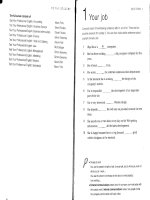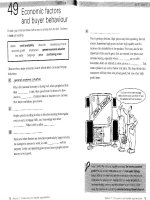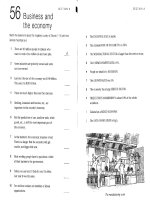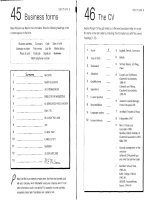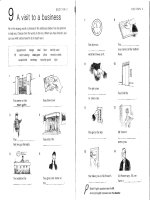Test Your Professional English - Marketing_phần 3
Bạn đang xem bản rút gọn của tài liệu. Xem và tải ngay bản đầy đủ của tài liệu tại đây (1.63 MB, 18 trang )
Economic factors
and
buyer behaviour
from the box. The items
Fill each gap in the text below with a word or phrase
in bold are headings.
employment
economic growth
loss leader
discretionary income
-general-ecenemic situation
discounts
credit availability
assets
outgoings
price
purchasing power
consumer buying
There are four major economic factors which affect
behaviour.
general economic situation
‘This is perhaps obvious. High prices may limit spending, but not
always. Sometimes high prices indicate high quality and this
increases the desirability of the product. Price may also be less
important if the need is great. But, in contrast, low prices may
increase buying, especially where __
__ are on offer.
Sometimes items are offered at alow priceasa___
ss. This
means products are sold at below cost price. The shop thinks that
consumers will buy these low priced goods, but also other high
profit items.
feel that
When the national economy is doing well, when people
is safe, they spend more. In times of a slow
their
down
| just care in for some tea bags
and a chicken curry, but I think I'll have
, if interest rates or taxation rates increase,
in
this entertainment centre instead.
then buyer confidence goes down.
——__——————————
their regular
People spend according to what is left after meeting
and other
costs on rent, mortgage, bills, tax, borrowings
. What is left is called
se
happy to lend,
Banks and other lenders are sometimes particularly
such as
for example to anyone in work, or with
people borrow
property. Credit card spending goes up and many
money to buy goods.
72
Section
7:
Consumers
and
market
segmentation
Section
7:
Consumers
and
market
segmentation
73
} Consumers and
Market —
lifestyle
Match the consumer type (1-8) to the lifestyle definitlons (a-h).
segmentation
Mark statements 1-8 T (True) or F (False). ff a statement is false, correct it.
This person has a traditional, conservative
achiever
and conformist lifestyle. He or she likes to
feel comfortable but does not like change.
belonger
This person has the original idea to do
something.
This person is young,
decision
ambitious,
successful, hard-working and determined
maker
to win in life.
and seeks to become richer and more
successful, but is content with life.
This person has worked hard and got
what he or she wanted. He/she is rational
emulator
and reasonable.
This person announces that something is
influencer
going to happen.
This person tells other people about an
initiator
innovation they think is a good one, and
recommends buying.
This person is unable to survive well
integrated
Social marketing targets particular consumers according
to their socio-economic group.
T/F
Target marketing is concerned with advertising to
particular groups of consumers.
T/F
Differentiated marketing aims to appeal to specifically
identified groups of potential users of a product.
T/F
Undifferentiated marketing is all kinds of marketing
techniques used at once.
This person is ambitious and competitive,
dependent
1
“6°
Segmentation strategy is an attempt to divide the total
market into specific types of consumers.
TIF
Product positioning is a way of promoting goods in stores.
T/E
Industrial marketing is the marketing of manufactured
goods.
Consumer watchdogs have become
more common
especially in service industries and in public sector.
alone because of age, lack of money or a
physical or mental disability.
74
Section
7: Consumers
and
market
segmentation
Section
7: Consumers
and
market
segmentation
75
2
segmentation
the next
Complete the table below by writing the words and phrases fran
page under the right heading.
climate
Types of market segmentation
"
Demographic
Behaviouristic
Benefits
segmentation
segmentation
segmentation
use/non-use
of product
product
characteristics
age
ethnic origin
size of company
nationality
region
political beliefs
-epiniors-
-use/non-ise-of product
turnever
leisure interests
Geographic
segmentation
state/country
Industrial market
segmentation
Psychographic
segmentation
turnover
opinions
Urbar/suburbar/rural
-ageknowledge/awareness of a product
attitudes to a product
state/eountwtype of company
sex
product performance
Sartion
7:
Consumers
and
market
seqmentation
Section
7:
Consumers
and
market
segmentation
77
Industrial marketing
Industrial marketing is marketing by companies where the target
audience is another company,
or organization, not individual
B’
Find words in the text above which go with these clefinitions. They are
in the right order.
++
Special reduced prices
consumers or members of the public. Completely different marketing
strategies are involved.
=A.
Read the extract from a management training book below. Fill in the
gaps with headings from the box.
-2°
Conditions attached to payment,
such as dates and credit
Special industry events to show off products
buyer factors
exiernal factors
orice and promotional factors
needs
supplier factors
Specialist magazines
Rules about buying goods and services
Influences on industrial purchasing
Industrial marketers must understand what affects buying decisions in
companies and organizations. Then they can plan a marketing strategy. We
can say that buying is affected by five factors.
ote
, for example discounts, special prices and terms,
as well as the influence of advertising, free samples, and trial offers.
, or what people say about the company,
exhibitions and trade fairs, reviews and comments
in trade journals,
and also any relevant seasonal factors.
__. Examples are the buyer’s experience, and
knowledge of the product, and of the potential suppliers. The culture
of the buying organization is also important, and an understanding
of the company purchasing policy. The size, complexity, level of
technology, and financial resources are all important. A final factor in
this category is the structure of the organization, and the role of
senior executives in buying decisions.
including level of urgency, stock levels, and the
perceived value of the purchase to the buying organization.
include competitors and rival offers, the quality
and availability of the product offered, after-sales service, location
and labour relations at the suppliers. Another significant factor here
is the relationship with existing suppliers, including personal
relationships, and the desire for continuity.
78
Section
7:
Consumers
and
market
segmentation
" Porter M., Competitive Strategy: Techniques for Analysing Industries and Competitors, (New
York: Free Press,
1980), p. 7
Section
7: Consumers
and
market
segmentation
79
Nướng
GIỆTS,
SP 3 re nànhe
ee
- Key word is 6
Match each word (1-6} with its opposite (a-f.
overseas
free market economy
strength
global
buyers
domestic
supply
weakness
command economy
suppliers
local
demand
Now fill each gap in the sentences with a word or phrase from part A.
Nabisco has dominated the
biscuit market in
the USA for over 60 years.
The enormous
of the McDonald’s brand
name has helped the company to enter new markets all over the
world.
A
of small retail businesses is their inability
to compete with larger competitors in fixing favourable terms
with
-
Ali major European manufacturers have to look to
markets to increase their turnover.
When commercial
purchase large quantities
of goods, it is often possible to achieve important cost savings.
Effective pricing policy depends on the
and
relationship.
The WTO,
NAFTA, Japan and the EU are committed
to the values
of the
Globalization has caused many businesses to look to
markets and not just
ones.
80
Section
8: Planning
and
international
marketing
Section
8: Planning
and
internatinnal
marketing
O4
More key planning -
Marketing
terms
Fill each gap in the sentences below with a word or phrase from the box.
t (D). If they are
Decide if the following terms are the same (S) or differen
accountability
different, explain how.
|
strategy / plan
customer/ client
free market / market economy
competition
-eeeremies-etsealeexternal audit
marketing audit
marketing research — public sector
service
TA se
=
=
pout oneal
economies of scope
marketing planning
os
~
Increasing production by 25% does not increase costs by much,
because we are able to take advantage of economies of scale .
market trend / market survey
A complete
will demonstrate all aspects of
our performance in terms of meeting our marketing objectives.
marketing mix / advertising mix
product mix / marketing mix
is essential to prepare clear objectives and
mission statement / corporate mission
a strategy for reaching our objectives.
opportunities / threats
The
the company’s control.
royalty / franchise agreement
examines factors which are not under
By having documentation which can be used in various markets
we are able to take advantage of
state sector / public sector
{4
planning
service industries / tertiary sector
We are conducting
aspects of our company performance.
accounting / accountability
to try to improve all
We know that marketing planning has a long history in the
private sector and in manufacturing. Recently there has been a
new emphasis on planning in the
and in
all kinds of
industries.
Public sector marketing has had to respond to increased
—
andtheneedfor
all areas of service provision.
iin
(London: Financial
1 Hannagan T., Management: Concepts and Practices, 2nd edition
Times/Pitman Publishing, 1998), p. 125
nl
Pinan
Section
8: Planning
and
international
marketing
83
The international
trading environment
Choose the correct term for each of the definitions.
The market consisting of the country where a company is based
and no other countries.
a) servant market
Factors which i) probably have a negative affect on company
performance, ii) are within the company’s control, and iii) are
identified during an analysis of marketing performance and
prospects.
a) weaknesses
(6) domestic market
b) threats
c) local market
Factors which i) may have a negative affect on company
control and
performance, but which ii) are outside the company’s
iii) are identified during an analysis of marketing performance
and prospects.
a) weaknesses
b) threats
c) quotas
A contract which allows another company to make your product
and states the terms of payment.
a) franchise
c) failures
A body which negotiates and then monitors international trade
agreements.
a) World Trade Organisation (WTO)
b) General Agreement on Tariffs and Trade (GATT)
c) World Bank.
Companies which advertise and trade internationally using their
own website on the Internet
a) high tech companies
b) dot.com companies
c) Internet Service Providers (ISPs)
b)a patent
c) a licence agreement
The action of making illegal duplicates of copyright material.
a) black market
b) cloning
¢) copyright infringement
Cash incentives provided by a government to encourage a
company to do business overseas
a) export taxes
b) export tariffs
c) export subsidies
A large company with subsidiaries in many different countries.
a) a multinational
b)a holding company
c) a corporation
84
Section
8: Planning
and
international
marketing
Section
8: Planning
and
international
marketing
85
YO
International
marketing
Read this extract from a marketing consultant’s report on aptions for Apsa, a
Spanish food distrioution company planning to expand into an international
market. Then fill in the missing information on the next page.
Central/South American expansion:
Options and recommendations
International marketing is a major step beyond simple exporting. Exporting
remains essentially focused on the home producer. International marketing, in
contrast, establishes a genuine presence in new markets and involves major
capital investment.
Countries: Mexico and Chile
Preferred expansion method
Advantages:
Possible difficulties:
Recommendations:
Countries: Peru and Bolivia
|
Preferred expansion method:
eee
Advantages:
Sources of income:
APSA’s marketing strategy in seeking to expand in Central and South America
involves four options:
1. International marketing strategy: setting up manufacturing and sales
subsidiaries. This offers the opportunity for full integration in the target
market. However establishing subsidiaries is of course very capital intensive,
and can be risky unless a lot of preliminary market research is done. Research
must include finding out about the economy, local habits and customs, as well
as about the markets for the products. This would be appropriate for
Argentina, where establishing a subsidiary may be the best option. With this
kind of international marketing, the subsidiaries should operate as
independent cost centres with local management.
2. A second option is franchising, or other joint ventures or partnerships
with established players in the market. This is usually less capital intensive
and is probably best for Peru and Bolivia. Another advantage is that
franchising is common in the food and drinks industry. With franchising
individuals pay to use the name of a well-known manufacturer. The franchisor
can insist on various policies, standards and purchasing practices, as well as
receiving license payments and other fees from the franchisees.
3. A compromise, some way short of international marketing, is to usc overseas
agents and distributors. This is closer to a simple exporting strategy than
international marketing, but it can be effective, and is definitely much cheaper.
‘We recommend this option in Mexico and Chile. A possible problem is conflict
of interest where an agent-also handles a competitor’s products. We suggest
Apsa should try to obtain sole distribution agreements for these countries.
4, The fourth option is to abandon plans for international marketing and keep a
simple export strategy, using direct links between APSA and customers. We
do not recommend this as growth potential is very low.
Pe
CAntinn
@:
Blanninga
and
intarnatinanal
markatina
Countries: Argentina
Preferred expansion method:
ee
Advantages:
ee
Main disadvantages:
Recommendations:
—__
ee
ee
Growth-Share Matrix
Cash Cows make a lot of money.
Matrix and
Read the extract from a training seminar on the Growth-Share
If they
study the diagram. Then mark statements 4~10 T (True) or F (False).
are false, explain why.
High
High
CASH GENERATION
(market share}
Low
CASH USE
(growth rate}
Low
The Growth-Share
(DF
Products shown to be Dogs in the growth-share
matrix usually need a lot of money spending on
them. Perhaps they are not worth it.
T/F
Stars can make good short-term profits even though
they use a lot of cash.
T/F
The Growth-Share Matrix is a planning tool designed
to show which products need extra marketing support
and which should be abandoned.
T/F
Question Marks are also known
as Problem Products.
T/F
Companies need to make a decision on what to do
with Question Marks - they might develop into Stars
if given extra support.
T/E
Matrix
Group. It is
The Growth-Share Matrix was originally conceived by the Boston Consulting
— in
support
extra
basically a planning tool to help marketers decide which products need
terms of cash investment — and which should be dropped completely.
require
Cash Cows are the dream product: they generate high income but don’t actually
hand,
other
the
on
Star,
A
itself.
markets
practically
[5] a lot of spending. A Cash Cow product
might
it
hope
You
high.
is
budget
g
advertisin
the
is a new product, it requires a lot of cash,
profit.
become a Cash Cow, but for now it offers a possibly very high short-term
of cash
lot
a
need
Question Marks, also known as Problem Products, probably
successful.
really
be
investment to tun them into Stars, On the other hand, they may never
they
but
At least the choice is usually clearer with Dogs: they don’t use much cash,
[10]
don’t generate much income, either; they can probably be dropped.
A related concept to the Growth-Share Matrix is the idea of a Strategic Business Unit
centre, and then
(SBU). This is the idea of treating each product area as an individual cost
T/F
The SBU is a tool used to identify strong and weak
products — or product areas — in a company’s product
portfolio.
T/F
‘The SBU approach treats whole companies as a separate
item, and highlights profit or loss.
‡
T/F
The SBU approach only works in manufacturing
industries.
T/F
areas —
being able to assess whether it is profitable or not. Profitable products — or product
weak.
be
to
shown
are
ones
le
unprofitab
and
are clearly identified as profitable, but weak
a weak product
With this information, it is easier to make decisions on whether to promote
it. Ifa
drop
to
better
be
area using different and better marketing, or whether it would
new
develop
to
or
failing product is dropped, then resources can be moved to other areas,
opportunities.
ri a=t#ti¬anal
xm¬rkkn†tinm
Section
8: Planning
and
international
marketing
89
)
Marketing
audit
Answers
Test1
Read this email from a director of a financial services company to a colleague
1
2
in an overseas subsidiary. Then fill each gap with a word or phrase from
the box.
product
place
3
-demestic-
export
marketing aucit
external audit
SWOT analysis
threat
trend
time
Hello Isabelle,
NQ
A
|A|S
H
LID
Ol
os
0
B
J
2
3
4
5
6
examining factors outside our immediate control.
We expect that the major (6)
to improved performance
in our domestic markets is the weakness of the national economy. The good
news is that while home sales have fallen, our (7)
performance has been good. The (8)
in our key
international markets is positive.
Please call me when you return to the office to discuss this in more detail.
Cheers,
John
Cc
A
RKE
F
W
FGHS
G
aaa
intormatinnal
marketing
10
©
11
quality
research
customers
goods
services
product
7
8
9
1Ơ
11
distribution
marketing
plan
mix
demand
market/products
advertise/consumers
analyse/suppliers/consumers
import
supply
competition
sponsorship/advertising
1
2
3
4
5S
6
7
i
Test 4
A
le
3b
2a
Ốc
3e
1. consumers
2 customers
3 marketers
4 research
Test3
A
1 market
5 demand
6 distribution
7 mix
marketer
market, marketing
competition
Panta
9
B
distribute
distribution
3 compete
an
7
distributor
competitor
B
1
2
3
4
5
Test
1
2
3
4
9b
10
7a
b
lic
12a
8a
4b
2
ae
6
8
LY.
(5)
service
price
promote
distribute
RQAJ
|) KL M@ Lay
Cju[s TOMER
Spo
Jr
up to date while you are away. Since there has
domestic
sales we have decided to
to identify areas where improvement
a typical (3)
with an
look at factors within the company and an
11.
12.
13
14
advertise
advertiser
advertising, advertisement
supplier
supply
supply
sponsor
sponsor
sponsorship
consumer
consume
consumption
producer
produce
product, production
analyse
analyst
analysis
researcher
research
research
importer
import
import/s
5
produet
Test 2
A
Date 22 Jan 2000-15:48:45 +0900
From: J.A.W. Financial Services PLC
To: ‘Isabelle Braque’
Subject: Re. Update/news
Just a short note to bring you
been a decline in our (1)
carry out a (2)
can be made. This consists of
(4)
to
10
4 needs
5 profit
6 customers
7 want
internal audit
4
8 producing
9 developing
market leader (or market share)
campaign
market share
sponsorship
distribution (or shipment)
5
Product
Price
Place
Promotion
5S People
6 Packaging
7 Physical evidence
8
Process
Answers
Ø1
Test 9
RDA ARWNH
WON
Test 10
A
brand identity
brand name
brand image
own-brand
brand valuation
unbranded
intangible assets
brand loyalty
premium brand
5
6
7
8
mix
plan
trends
analysis
Test 12
5 Our R & D department designed
the Triple X Pathway over a fiveyear period ...
4 ... and the product was finally
launched this year.
6 The core product is, of course, a
personal computer ...
2 ... but the augmented package
includes ten types of software, a
DVD drive, speakers, a printer, a
scanner, manuals, free internet
access, a free on-site warranty and
the prestige of the Triple X brand
name.
8 Of course, all components used in
the manufacture of the Triple X
Pathway have been well tested.
9 We offer a full after-sales service ...
1... and an extended five-year
warranty with absolute
confidence,
7 Furthermore, we expect the
product to experience rapid early
sales for at least three years ...
3... before being joined by me-too
products from our competitors.
92
Answers
anew”
œ
DR
A
B
return
penetration, consumers
extend
development, quality, appeal
markets
research, decision-making
B
warranty
Cc
on-site
Test 15
1
consumer
4
durables
2 perishable
3 products
5
added
Test 16
1 off
2 by
3
4
away
back
G
retailer
service
purchased
patent
flop
on
on
to
into
T
{S|
IN}
O
[I
E
JE) oO
Jr
NT
OR
ff)
JE)
VIF
R
MS)|V|I
|O
PŒ
LMHUEebGP
1 profit
2 revenue
3 margin
4 price
$
6
7
8
1e
2c
4b
Sa
la
2d
3b
4e
Sc
3d
parts/labour
labour/parts
support
11.
R
íC][E)L
|JOJU
E
discount
fee
demand
costs
A
launched
12
I
c
Test 18
Test 14
10
P
W
AI
potential
portfolio
positioning
state-of-the-art
after-sales
network
customer
helpline
premium
C
NI
aD
Test8
1 goods
2 free
3 research
4 demand
E|
maturity
saturation
decline
mN
c
i
Œ_R
Dis
OC
a
5
A
Œœ Ơn
b
h
đevelopment
launch
growth
i
d
Test 17
A
@
e
CAN
AM RwWNe
f
Test 11
augmented product 7e
clone 5¢
consumer durable 2d
core product 9f
fast moving consumer goods 8b
generic product 1g
perishables 3a
primary manufacturing 4j
sell-by date 10i
service 6h
¬
Test 7
XÐ
WO aN
@ xi
product
price
place
10 promotion
11 process
12 people
13 physical evidence
(7-13 in any order)
Ơi Ơn Hè G2 bà
mix
Test 13
@ xi
Œứn
opportunities
threats
brand name
brand valuation
unbranded
brand image
own-brand
intangible assets
brand loyalty
premium brand
brand identity
`Ð
B G2 bà
weaknesses
Œ
AMA
bề G2
B2
=
Test 6
plan
strengths
1
2
3
4
5
Test
1
2
3
4
5
6
7
8
9
10
elastic demand
penetration strategy
premium-priced
fixed costs
budget-priced
19
advance orders
break even
Production costs
high penetration
premium price
recommended retail price
factory gate price
price war
Aggressive pricing
market share
Test 20
1 False. Budget-priced means lowpriced, not at a reduced price.
2 True
Answers
93
la
2€
3a
4b
may be offered to a frequent
customer, or if he/she buys several
products.
Test
1
2
3
4 True
21
unit cost
retail margin
selling costs
price war
Test 22
1h
2f
3a
4
6
7
going rate
Qa
10 a
11b
l2 a
B
S
services
i
despatch rider
3
4
delivery van
freight train
2 container lorry
c
demand curve
lec
2¢f
Test 26
le
2b
34
over the Internet
home shopping
e-shopping
94
Answers
EIT Electronic Funds Transfer
ICT Information Communications
Technology
ISP Internet Service Provider
1 f
Sp
6 provider
7 user
8 distribution
9 Place
5
6
7
barge
container ship
cargo plane
3d
4a
9a
6n
7C
4e
8
10b
ll
1
o
12h
the Internet
A personal
identification for
access to a website
or a security
Looking for
e-commerce
e-business
access code
password
surfing
browsing
i
16
m
(CMS)
2 vertical marketing system (VMS)
3 total systems approach (TSA)
Test 32
banner towing 5
billboard 9
flyer 10
free sample 11
freebie 3
newspaper advertisement 8
offer 4
sandwich board 2
sponsorship 7
T-shirt advertising 6
TV commercial 1
consumers 2
e-business
Test 34
11
mail order 10
middlemen 4
multiples 9
producer 1
retailers 8
sales forces 5
information on
the Internet
18
Test 31
1 conventional marketing system
Test 33
commercial 6
discount 2
mailing list 9
mass media 5
point-of-sale advertising 7
reply coupon 3
slogan 1
target audience 8
website 4
large multiples 3
mail order 8
mail order companies 1
purchasing power 4
specialist retailers 12
iclesales staff 9
warehouses 2
sales representatives 6
wholesalers 3
Business over
k
14 g
internet service providers (ISPs) 15
despatch 7
4b
5a
6a
13
Test 28
chain stores 13
cold-calling 10
commission 7
door-to-door selling 6
e-commerce 14
franchises 5
hypermarkets 11
Test 29
protected resource
virtual shopping
2
8 vending machine
9 copyright
Electronic Data ‘Transfer
3 ij
Test 27
A
Buying things
EDT
2d
agent
1 goods
2 producer
3 customer
4 intermediary
1
3
C
Test 25
A
B
4
24
producer
haulage company
distributor
5 sales representative
6 retailer
7 customer
5 budget-priced
GON
9
10
11
og
8
sc
7
rad
6
DO
Test
1
2
3
4
un
12
True
False. The factory gate price is the
price a manufacturer asks when
selling a product to a wholesaler,
agent or retailer.
False. Production costs are all the
expenses a manufacturer has to
pay to produce a product,
including labour.
False. The market price is the
typical price that different
companies ate asking for similar
products.
True
‘True
Ealse. The wholesale price is the
price a retailer pays a wholesaler
for a product.
True
5b
64
7b
8e
Test 30
commission
agent
sole distribution agreement
sales force
independent distributor
patent
WON
ƠŒ Ơi
G2 hộ mỉ
Test 23
False. A discount is a specially
reduced price, usually for a
particular customer. A discount
NDA
0) ba
3
10
11
12
13
catalogue
hard sell
competition
impulse buying
campaign
consumer awareness
advertising mix
commercials
advertisements
direct mail
mailshot
website
online
shelf space
franchise agreement
Answers
95
consumer research 4
focus groups 5
in-house research 13
96
Answers
oo
1T
2T
3
Ta
st 43
information
objectives
methods
On
ứéH C2 b)
*1Ơ
a
clinical trial
biased survey
research brief
random sample
closed question
computer analysis
consumer awareness
quota sampling
total population
personal interview
T
7%
A
I
GIMR
|E|H
GE|NDI
BC
DÍÀB|A|E
VỀ I
|OUJRR
FEFEIYN
T) HI
C S)IAl I
A
NMGELS
PILIM
U SCL
LOY
I
F
E
S
[tly
D
L
LB
MENTWtruc
QTTITUDENsS
B
2
positioning
E
&
5 attitude
6 ethics
7 behaviour
8 target
A
1g
sc
2d
6
1 about, in
2 with, at
3 on, of
4 to, on
5 into, of, in
6 with, of
7 of
8 for, to
3a
4e
f
b
Test 49
general economic situation,
employment, economic growth
purchasing power, outgoings,
discretionary income
credit availability, assets
Price, discounts, loss leader
6 results
7 analysis
8 present
9
F The respondents were aged
15-20
T
F 15% claimed to eat reasonably
healthy foods most of the time.
6% said they always ate healthy
foods,
F This is not clear from the results
T
N€
WIN
œ xi Ơn
Test 46
œ
nan”
eo
Test 42
surveys
ga
Down
1 competitor analysis
2 computer analysis
3 personal interview
6 open question
a) T,b) Fc) Ed} F
sources
DIAW
bà
pe
dso
WNP
AM
WOON
1
a)T, b) T, c) E, đ) F
a)Eb)Ec)T, dạT
a) T, by To RAF
a) T, b) Ec) T, d) F
a) E, b) Fc) T, d)T
© \2Œœ
au
b)T, co) T, cd) F
Ti
ONING
L MOGR
GFE
DAQUL
R
G
oman
consumer awareness 11
aE
a
advertising research 12
causal research study 3
10
11
a)E,b) E c)T, đ)T
ee
RWNH
COmMNAO
Test 40
rn
op
NOOB
an in-store promotion
on-pack promotion
perimeter advertising
BOGOF(Buy one get one free)
online advertising / advertising on
the web / Internet advertising (all
are possible)
8 cold calling
cluster sampling
pilot questionnaire
quota sampling
opinion poll
fieldwork
closed question
structured survey
random sampling
4)T, Ð}T,
c) E d) E
WN
direct selling
ab
Whe
direct mailing
a) E, b) T, c) T, d) F
a) Fb) T, c) T, d) F
Test 47
O(S)I_
P
BIE|/K
ON/GL
mmen
he
on BW
SE a
Test 41
Test 37
Test 39
survey
market researcher
poil
sample
questionnaire
data
bias
subject
respondent
Across
secondary research 14
consumers
3
4
Test 46
tepresentative 6
targets, promotes
image
Test 38
id
2£
market research brief 2
observational research 10
pilot questionnaire 9
population 7
questionnaire 8
Hà Q9 Bộ
Test 36
- unique selling proposition
publicity
rational appeal
emotional appeal
Test 44
lc
1
Pome
nữ
oh
sO oN
m
3b
aur
2c
market research
©
Test 35
1i
monitor
Answers
97
¬
;
1 discounts
2 terms
.
3. trade fairs
:
4 trade journals
5
purchasing
polic
p
§ policy
6 stock levels
.
.
7 after-sales service
aa
8 labour relations
product characteristics
age
product performance
sex
ethnic origin
nationality
Geographic
segmentation
Industrial market
segmentation
Psychographic
segmentation
state/country
turnover
opinions
98
Answers
political beliefs
leisure interests
Test 56
economies of scale
marketing audit
marketing planning
external audit
economies of scope
marketing research
public sector, service
competition,
Test 57
1 b
2
3
b
c
Countries: Peru and Bolivia
Preferred expansion method: franchising,
joint ventures or other partnerships
Advantages: commion in food and drinks
industry, less capital intensive
Sources of income: license payments and
other fees from. franchisee
Country: Argentina
Preferred expansion method: international
marketing strategy, setting up manufacturing
and sales subsidiaries
Advantages: full integration in target market
Main disadvantages: very capital intensive,
tisky
Recommendations: carry oul detailed market
research, tun subsidiaries as cost centres
Test 59
1 True
2 False. Usually the opposite: to drop
them, spend no money.
3 True. Stars can make good short
term profits and may become Cash
Cows, therefore producing long
term profits.
True
True
‘True
False ~ Strategic Business Unit
True
False ~ it looks at individual!
product areas, or even individual
products.
10 False ~ the text does not say this.
Anyway, the SBU approach can be
used in manufacturing or in
xi GŒ
use/non-use
10
11
12
Different. A royalty is a
commission paid on the number
of sales; a franchise agrcement is
an agreement to use a famous
product identity, logo, name,
marketing approach, etc.
Same
Same
Different. Accounting is the job of
looking after, preparing and
presenting company accounts or
finances, Accountability is the
obligation to mect certain
standards that society expects.
agent also sells competitor's products
Recommendation: set up sole distribution
agreements
œ
uyers
6 supply, demand
7 free market economy
8 global, local
Demographic
segmentation
type of company
size of company
positive; threats are negative.
strength
3
khess, supplier
2 WEAKTIESS, SUDp/IGT
4 overseas
5
:
Benefits
segmentation
urban/suburban/rural
region
climate
Sa
6b
Test 58
Countrics: Mexico and Chile
Preferred expansion method: overseas agents
and distributors
Advantages: effective, cheap
Possible difficulties: conflicl of interest if
Ð
2
3e
4f
Test 52
Behaviouristic
segmentation
of product
knowledge/awareness
of a product
attitudes to a product
something is moving in, e.g. sales.
Different. The marketing mix is all
aspects of marketing; the
advertising mix is the combination
of different advertising techniques.
Different. Product mix is the
variety of products on offer from a
certain company; the marketing
mix is the combination of factors
involved in how a company
markets itself.
Same
Different. Opportunities are
service industries, and in the
accountability
a pS
True
market; a trend is the direction
supplier factors
Test 54
A
le
2d
B
1 domestic
targets individual consumers.
ˆ
needs
customer buys a product.
Same
Different. A survey investigates a
5
B
5
3
owen
8
4
Price and promotional factors
external factors
buyer factors
Test 55
1 Same
2 Different. A client buys a service; a
een
has to be
protected, women should look
after the children.
2 False. Target marketing is
R
.
concerned with making sure a
product is appropriate for
aps
:
"ee
specifically identified needs.
2
ý Trúc
4 False. Undifferentiated marketing
or
:
.
is aimed at everyone in society. ít
.
promotes a product and its
:
;
teputation for everyone, not just
users.
S True
6 False. Product positioning aims to
ensure that a product has unique
and đistinguishing features,
appealing
particul. consumers
umers.
ppealing to particular
7 False. Industrial marketing is
.
.
.
marketing of goods and services
between companies. It contrasts
.
‘Lati
;
with consumer marketing, which
53
œna
wrong, the environment
Test
A
1
2
3
ArNankwANeE
Test 51
1 False. Social marketing takes
gencral attitudes in society into
account in all marketing
decisions, ¢.g. cruelty to animals is
private or public sector.
Test 60
1 domestic
2
3
4
marketing audit
SWOT analysis
internal audit
S
external audit
8
trend
6 threat
7 export
Answers
99
Word
list
compete 3
competition 3, 26, 34, 53, 56
The numbers after the entries are the tests in which they appear.
A
above-the-line
access code 27
accountability
accountable 26
accounting 55
achiever 50
action plan 5
added value 6,
advance orders
advertisement
promotion 35
$5, 56
7, 15
19
3, 34
advertising 3, 16, 32, 36, 52, 53
advertising (planning) 34, 59
advertising budget 59
advertising campaign 34
advertising mix 34, 35
advertising research 40
after-sales assistance 14
after-sales service 12, 53
agency research 41
agent 20, 24, 30, 58
aggressive pricing 19
AIDA 35
air freight transportation 25
analyst 3
analysis (of research data) 43
appeal 13
application (of research results) 43
assets 49
attitude 44, 47
augmented package 12
augmented product 9, 11
B
banking 26, 28
banner towing 32
barge 25
behaviour 47
behaviouristic segmentation 52
belonger 50
below-the-line promotion 35
benefits segmentation 52
bias 39, 42, 46
billboard 32
BOGOF 37
Boston Consulting Group (BCG) 59
brand 10
brand identity 9, 10
100
Word
list
brand image 10
brand loyalty 16, 48
brand name
9, 10, 29, 54
brand strength 10, 54
brand valuation 10
branding 10
break-even point 19, 22
browsing 27
budget priced goods 18, 20, 21
buyer 54
buyer behaviour 48, 49
buyer confidence 51
buyer factors 53
buyer's experience 53
buyers’ market 5
buying decisions $3
buying direct 24
buying group 28
buying organisation 53
consumer awareness 32, 34, 36, 40,
41, 42
consumer behaviour (See buyer
behaviour)
consumer demand 21
consumer
consumer
consumer
consumer
consumer
durable 11, 15, 48
goods 15
marketing 48
reseatch 40
types 50
consumer watchdog 26, 48, 51
consumer 2, 3, 13, 20, 29, 33, 36, 47
consumers (and lifestyle) 50
consumption 3
container lorry 25
container port 25
climate 52
clinical trial 41, 42
45
45
54
54
commission agent 30
communication 33
communication skills 26
company valuation 10
D
data 39
dealers 29
decision maker 50
decision-making 13
decline 13
delivery van 25
demand curve 21
demand
2, 3, 8, 17, 18, 54
demographic segmentation $2
dependent 50
desk research 41
despatch 29
despatch rider 25
developing 1
development 13
diamond trading 4
differentiated marketing 51
direct costs 23
direct labour costs 23
direct mail 34
direct mailing 37
direct selling 29, 37
discount 17, 20, 33, 35, 53
discounting 22
discretionary income 49
distance learning 27
distribute 1, 3
distribution agreement 30, 58
distribution channel 24, 31
distribution methods 26
distribution research 41
distribution system 29, 31
distributor 22, 23, 24, 58
dog 59
cost centre 58, 59
client 49, 55
58
distribution 2, 3, 4, 6, 25, 30, 31
corporate image 38
corporate message 38
corporate mission 4, 35
corporate objectives 55
corporate strategy 55
cost benefits 28
causal research 41
chain stores 28
chains 29
civil servants 42
23, 28
component 12
computer analysis 42, 45
conflict of interest 58
core product 11, 12, 26
catalogue 29, 34
commission
competitor 5, 12, 21, 48, 54
competitor analysis 45
container ship (or vessel) 25
convenience stores 28
conventional marketing system (CMS)
31
copyright infringement 57
copyright 30
c
campaign 4, 34
cannibalism 9
capital investment 58
cargo plane 25
cartel 22
cash cow 59
cash investment 59
clone 11
closed question 42,
cluster sampling 44,
cold calling 28, 37
command economy
commercial 33, 34
commercial buying
competitive environment 26
customizing 27
customs (habits and customs)
cost of sales 23
cost price 49, 51
cost savings 54
domestic market
domestic 54, 60
12, 57, 60
costs 17, 23
coupons 37
door-to-door delivery 24
door-to-door seiling 28
customer 1, 2, 24, 25, 53, 55
customer awareness 39 (See also
download 27
down-market 18
dry port facilities 25
customer requirements
E
e-banking 27
dot.com 27, 57
courier service 25
credit availability 49
consumer awareness)
customer involvement 48
durables (See consumer durabie)
customer support 26
customer-oriented selling 35
customer power 55
e-business 27, 29
e-commerce 27, 28
economic factors 49, 58
11
Word
list
101
economic growth 49
economic price 20
economics of scale 28, 56
economies of scope 56
economy
58
elastic demand 18
electronic communication 26
franchise agreement 30, 55, 58
franchise 28
franchisee 28, 58
franchising 58
franchisor 28, 58
free market economy 4, 5, 54, 55
free sample 32, 37, 53
electronic data transfer (EDT) 27
electronic funds transfer (EFT) 27
freebie 32
freight train 25
email 27, 60
G
General Agreement on Tariffs and
electronic trading 27
emotional appeal 36
employment 49
emulator 50
entrants (to a market) 53
environmental issues 44
e-shopping 27, 28
ethics 47
ethnic origin 52
European Union (EU) 54
evaluation (of research) 43
exchange 15
exhibitions 53
expenses 17
expertise 11]
exploratory research 41
Trade (GATT)
gencric 9
57
generic advertising 35
generic product 11
geographic segmentation 52
get one free 37
global 54
globalization 54
going rate (the) 20, 21
goods 2, 8, 25
growth
(sales) 13, $8
Growth-Share Matrix 59
H
F
hacking 27
hard sell 34, 35
haulage company 24
helpline 14
High Street dealers 24
home delivery 28
home sales 60
home shopping 27
homepage 27
hypermarket 28
face-lift 13
face-to-face communication 26
face-to-face interviews (See interviews)
factory gate price 19, 20, 22
fashion items 13
|
image 36, 38
import 3
impulse buying (purchasing) 34, 48
incentives 57
11, 31, 48, 49
fee 17
fieldwork 44, 45
financial resources 53
Five Forces model 53
independent distributor 30
industrial market segmentation 52
industrial marketing 51, 53
industrial purchasing 53
industry environment 53
export 3, 60
exporting 4, 58
exports 57
extended life cycle 13
external audit 56, 60
external environment 55
external factors 53
extrapolation 44
fast moving consumer goods (FMCG)
fixed costs 18, 23
flop 15
flyer 32
focus group 40, 44
Foreign Direct Investment (FDD 54
Four Ps 5, 25
102
Word
list
income
17
inelastic demand
influencer 50
information 40
18, 22
information communications
technology (ICT) 27
information technology 45
in-house research 40
initiator 50
in-plants 28
in-store promotion 35, 37
intangible assets 5, 10
integrated 50
interest rates
intermediary
internal audit
international
49
20, 24, 25, 29
60
marketing 54, 57, 58
international research 58
international trade agreements 57
international trading environment 57
Internet advertising 35, 37
Internet Service Provider (ISP) 27, 28
internet 26, 27, 28, 29, 33, 57
interviews 45
invisible exports 3
involvement
(buyer) 48
L
labour 14
labour costs 23
labour input 23
labour relations 53
large multiples 28
launch 9, 12, 13
leaflet 14, 35
lending 49
licence 28
life cycle 13
lifestyle 47, 50
local 54
local government 26
local management 58
logistics 26
logo 36
loss leader 22, 49
loss leader strategy 49
low-involvement
goods 48
M
mail order companies 28
mail order 28, 29, 34, 37
mailshot 34
mailing list 33
malpractice 48
manufactured products (distribution
of) 24
manufacturer 29
margin 17, 20, 22
market 3, 4
market analysis 8
market analyst 4
market economy 55
market
leader 5, 25
market price 20
market research 8, 39, 41, 43, 55, 58
market research brief 40
market research (objectives) 43
market researcher 39
market segmentation 48, 50, 51, 52
market share 4, 16, 19, 21
market survey 55
market trend 55
marketeer 3
marketer 2, 3
marketing
marketing,
marketing
marketing
definitions of 1, 59
audit 56, 60
communications research
marketing
marketing
marketing
marketing
consultancy 5
consultant 31
decisions 40
ethics 48
marketing
marketing
marketing
marketing
marketing
marketing
marketing
objectives 55
people 3, 5
plan 6
planning 56
research 41, 56
strategy 40, 53
survey 46
41
2
marketing mix 5, 6, 8, 55
licence agreement $7
licence fee 30
loyalty 10, 16, 47
manufacturing 11
mass media 33, 35
mass media promotion 36
maturity 13
media 36
message 38
message content 38
message format 38
message source 38
message structure 38
me-too products 12
middlemen 29
mission statement 5, 55
mix 2 (See also advertising mix,
marketing mix, product mix)
modem 27
monitoring 43
moral code 48
Word
list
103
Meeserts
Se
moral judgements 47
multinational corporations 38
multinational 57
multiples 28, 29
N
nationality S2
needs
1, 53
negotiating 28
network 14
newspaper advertisement 32
niche marketing 48
0
observational research 40
obsolescent 13
occupation 42
offer 32
off-peak 27
omnibus survey 41
online 27, 34, 35
online advertising 37
online support 27
on-pack promotion 37
on-site warranty 14
open-ended research 44
open question 45
opinion 39, 44, 45, 52
opinion poll 44, 45
opportunities 6, 55
organizational marketing 26
organizational structure 53
organization
outgoings 49
26, 56
overheads 22, 23
overseas agents 58
overseas 54
own-brand 10
P
packaging 7, 35
part 9, 14
password 2.7
patent 15, 30
payment terms 53
peak time 27
penetration 13
penetration strategy 18, 19, 22
people 5, 6, 7,8
perimeter advertising 37
perishable goods
11, 15, 16
personal interview 42, 45
physical assets 10
physical evidence 5, 6, 7, 26
104
Word
list
pilot questionnaire 40, 45
pilot survey 44
pirating 57
place 5, 6, 7, 25
plan 2, 6, 55
planning 6, 29, 56
planning tools 59
point-of-sale advertising 33, 35, 37
political opinions 44, $2
poll 39
population 40
portfolio 13, 55
positioning 13, 38, 47, 51
potential 13
preliminary research 58
premium 14
premium brand 10
premium price 19
premium-priced 18
price 2, 5, 6, 8, 17, 20, 23, 50
price and promotional factors 53
price fixing 22
price sensitive 22
price war 19, 21
pricing policy 20, 54
pricing research 41
pricing strategy 20, 21, 22
plimary research 41
private sector 26, 56
problem products 59
process 5, 6
produce 3
producer 3, 25, 29, 31
producing 1
product areas 59
product characteristics 52
product failure 16
product life cycle 9, 13
product management 13
product marketing 9
product mix 55
product positioning (see positioning)
product portfolio 13, 55
product range 55
product recall 16
product research 41
product review 53
product success 16
product 1, 2, 3, 5, 6, 7, 10, 13
production costs 19, 20, 23
profit 1, 17, 59
profitability (measuring of) 59
promote
research plan 43
research problem 43
research process 43
researcher 3
researching competitors 45
1, 36
promotion strategies 35, 36
promotion
5, 6, 7, 32, 50
prospect 50
provider 2S
psychographic segmentation 52
public health services 26
public perception 36
tesources 55, 59
respondent 39, 44, 45, 46
results (of research) 43
retail
retail
retail
retail
public sector 26, 52, 55, 56
business 54
margin 21
outlets 28
price 20
public sector marketing 26, 56
public sector service provider 56
publicity 36
published research 44
purchase 15
purchaser 50
purchasing policy 53
purchasing power 28, 49, 51
purchasing practice 58
push strategy 35
tisk 58
toad haulage contractor 25
routine purchasing 48
royalty 23, 55, 58
Q
qualitative research 44, 45
quality (of marketing) 16
quality 2, 13, 26, 51, 53, 56
$s
safety fault 16
sale price 20
sales force 29, 30
question mark 59
questionnaire 39, 40
quota sampling 42, 45
sales team 29
tetailer 15, 20, 24, 28, 29, 31
return 13
revenue
quantitative research 44, 45
sales representative 24, 29
sample
R
R&
D Gesearch and development)
rail freight operator 25
random sample 42
random sampling 45
rational appeal 36
raw materials 23
recall, (see product recall)
recommended retail price (r.r.p.) 20,
20
refund 16
relationships 53
reliability 44
rental 29
repeat buying 49
teply coupon 33
representative (sample) 40, 44, 45
reps, (See sales representatives)
research 2, 13, 42
research (to do) 3, 41
research (types of) 43
research brief 42
teseatch methods 43, 44, 45
research objectives 43
17
12
(free) 39
sampling method 44
sandwich board 32
saturation 13
season 20
seasonal factors 53
secondary research 40
segment 47
segmentation strategy 51
select (a sample) 45
sell-by date 9, 11, 16
sellers’ market 5
selling 12, 28
selling costs 21, 23
selling methods (techniques) 28
service 1, 11, 13, 56
service industries 13, 52, 55, 56, 57
service providers 26, 56
services sector 57
services 2, 13, 25
shelf space 30
shelf-life 19
shipment 25, 29
shipping line 25
shipping methods 25
short term profit 59
skimming strategy 18
Word
list
105
slogan 33
small business sector 28
social marketing 51
social survey 46
society 48
socio-economic groups 42, 48, S1
sole distribution agreement 30, 58
sources (of information) 43
special offers 49
specialist expertise 11
specialist retailers 28
spending power 48, SO
sponsor 3
sponsorship 3, 4, 5, 32
standards 56, 58
star 59
state sector, (see public sector)
state-of-the-art 13, 14
statistical analysis 44, 4S
statistical data 44
statistics 46
status groups 42
stock levels $3
Strategic Business Unit (SBU) 59
strategic plan 55
strategy 43, 55
street market 28
strengths 6, 54, 55
technology 13
telephone
interview 46
telesaics staff 28
tertiary sector 55
threats 6, 55, 57, 60
tick boxes 45
time 1
total
total
trade
trade
trade
population 42
systems approach (TSA) 31
fairs 53
journals 53
28
trend 8, 58
trial offers 53
T-shirt advertising 32
turnover 52, $4
TV commercial 32
U
unbranded 10
undifferentiated marketing 51
unified distribution system 31
unit cost 21, 23
unit profit 22
unstructured survey 44
up-market 18
user 25
USP (unique selling proposition) 36
structured survey 45
subject 39
V
subsidies 57
substitutes 53
value for money 56
variable costs 18, 23
subsidiaries 57, 58
supermarket 28, 49
supplier factors $3
supplier 3, 4, 53, 54
supply 3, 54
support 14
surfing 27
survey 39, 43
survey design 45
survey results 46
SWOT analysis 6, 60
T
take-overs 10
target audience 33
target market 58
target marketing 51
target 36, 47
taxation 49
validity 44
valuation (of a company)
10
vending machine 30
vertical marketing system (VMS) 31
virtual shopping 27
Ww
want 1
warehouses 28
warranty 12, 14
weakness(es) 6, 54, 55, 57
web support 27
website 27, 28, 33, 34, 57
wholesale price 20
wholesaler 22, 25, 27, 31
World Bank 57
World Trade Organisation (WTO) 54 ,
57
world wide web (WWW) 28

